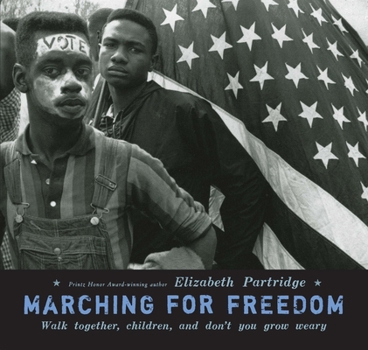Marching for Freedom: Walk Together, Children, and Don't You Grow Weary
Select Format
Select Condition 
Book Overview
An inspiring look at the fight for the vote, by an award-winning author Only 44 years ago in the U.S., Dr. Martin Luther King Jr. was leading a fight to win blacks the right to vote. Ground zero for the movement became Selma, Alabama. Award-winning author Elizabeth Partridge leads you straight into the chaotic, passionate, and deadly three months of protests that culminated in the landmark march from Selma to Montgomery in 1965. Focusing on the courageous children who faced terrifying violence in order to march alongside King, this is an inspiring look at their fight for the vote. Stunningly emotional black-and-white photos accompany the text.
Format:Hardcover
Language:English
ISBN:0670011894
ISBN13:9780670011896
Release Date:October 2009
Publisher:Viking Books for Young Readers
Length:80 Pages
Weight:1.25 lbs.
Dimensions:0.4" x 9.6" x 10.3"
Age Range:10 years and up
Grade Range:Grade 5 and higher
Customer Reviews
2 ratings
Eyes on the Prize
Published by Thriftbooks.com User , 15 years ago
From the first attempts of black citizens to register for the vote in Selma, Alabama, to the arrival of Martin Luther King, Jr., to the work of the Freedom Fighters and the violence of Bloody Sunday, the march to Montgomery gathered strength; resulting in the Voting Rights Act of 1965 and the right of black citizens to vote. Powerful black and white photographs paired with text will drive home the emotions and ordeals of this part of the Civil Rights Movement for children ages 9-12 and more.
Richie's Picks: MARCHING FOR FREEDOM
Published by Thriftbooks.com User , 15 years ago
Elizabeth Partridge prefaces the first chapter of MARCHING FOR FREEDOM with a series of four photographs that chronicle the July 8, 1964 arrest of young Samuel Newall. The series begins with Samuel standing alone in front of the Dallas County Courthouse in Selma, Alabama. He is quietly holding up a handwritten poster board sign that reads: "One Man One Vote Freedom Register Now SNCC" The photographs record the approach of deputies and the arrest of the young black child for quietly holding up the voting rights poster. Samuel Newall appears in the photos to be around nine or ten years old. "Across the United States, people were shocked that Dr. King encouraged children to join in the civil rights struggle. 'A hundred times I have been asked,' he said, 'why we have allowed children to march in demonstrations, to freeze and suffer in jails, to be exposed to bullets and dynamite. The answer is simple. Our children and our families are maimed a little every day of our lives. If we can end an incessant torture by an single climactic confrontation, the risks are acceptable.'" While Samuel Newall was getting arrested in Selma in the summer of 1964 for quietly holding a voting rights protest sign aloft, I was a nine-year-old spending the summer flipping baseball cards, riding my banana bike, playing kickball in the street, swimming at the beach, listening to the Beatles, reading Beverly Cleary, Walter Brooks, and the Sunday funnies, and regularly experiencing feelings of confusion and discomfort over the films running on the nightly newscasts of violence being perpetrated against Civil Rights protesters in the South. I was an attentive student -- both at school and at catechism -- and what I was seeing on TV just did not make sense given what I was being taught. What was it that I was missing? I stare at these photos of Samuel Newall, a black kid in Alabama dressed in an outfit so similar to those I wore as a child on Long Island, and I think about how easily, by virtue of birth, I could have been him. "'Don't worry about your children,' Dr. King had reassured parents. 'Don't hold them back if they want to go to jail.' He was in awe of their willingness and bravery. 'They are doing a job for not only themselves but for all of America and for all of mankind. They are carving a tunnel of hope through the great mountain of despair.'" Chronicling in word and in image the brutal and sometimes deadly events in early 1965 that led to the Selma march and to the subsequent passage of the Voting Rights Act of 1965, Elizabeth Partridge focuses MARCHING FOR FREEDOM on the role of children participating in the Civil Rights movement. The author sought out members of my generation who were children at the center of the action during those tumultuous and tragic days when peacefully protesting Americans were arrested and sometimes murdered at the hands of racist mobs and Southern white cops. It is powerful to hear recollections of now-grown





